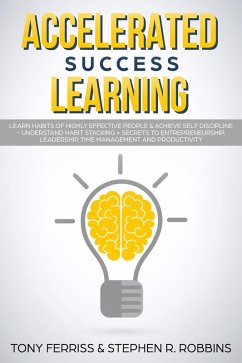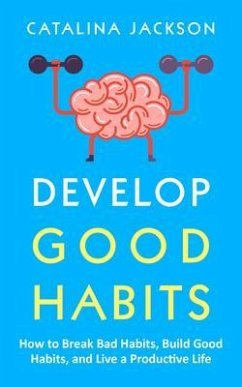
Habit Stacking for Kids Instilling Lifelong Habits Effectively (eBook, ePUB)

PAYBACK Punkte
0 °P sammeln!
Habits play a significant role in shaping our lives, and this holds true for children as well. From the moment they wake up to the time they go to bed, children engage in a multitude of habits that influence their behavior, learning, and overall well-being. We will explore the power of habits in shaping a child's life and how they contribute to long-term success.The Formation of HabitsHabits are formed through repetition and routine. As children engage in certain actions or behaviors repeatedly, neural pathways are reinforced in their brains, making those habits automatic and ingrained. Whethe...
Habits play a significant role in shaping our lives, and this holds true for children as well. From the moment they wake up to the time they go to bed, children engage in a multitude of habits that influence their behavior, learning, and overall well-being. We will explore the power of habits in shaping a child's life and how they contribute to long-term success.
The Formation of Habits
Habits are formed through repetition and routine. As children engage in certain actions or behaviors repeatedly, neural pathways are reinforced in their brains, making those habits automatic and ingrained. Whether it's brushing their teeth, reading before bed, or completing homework promptly, these habits become second nature to children, shaping their character and defining their daily routines.
Creating a Foundation for Success
By instilling positive habits in children from an early age, parents and caregivers lay a strong foundation for their long-term success. Habits such as discipline, organization, time management, and perseverance become essential life skills that children carry with them into adulthood. When children learn to consistently practice these habits, they develop a sense of responsibility, self-control, and resilience, which are crucial for achieving their goals and overcoming challenges.
Impact on Academic Performance
Habits have a direct impact on a child's academic performance. Establishing habits like effective study routines, regular reading, and completing assignments on time fosters a disciplined approach to learning. When children develop good study habits, they become more focused, attentive, and motivated, leading to improved academic achievements and a love for lifelong learning.
Building Emotional Intelligence
Habits also contribute to a child's emotional intelligence and social skills. Positive habits such as active listening, expressing gratitude, empathy, and conflict resolution promote healthy relationships and effective communication. When children learn to cultivate these habits, they develop emotional awareness, empathy, and the ability to build strong connections with others. These skills become invaluable assets in their personal and professional lives.
Health and Well-being
The habits children form early in life profoundly impact their physical and mental well-being. Encouraging habits such as regular exercise, healthy eating, proper sleep, and personal hygiene sets the stage for a healthy lifestyle. When children internalize these habits, they are more likely to carry them into adulthood, reducing the risk of chronic diseases, promoting overall well-being, and fostering a positive body image.
Long-Term Behavior Patterns
The habits children develop during their formative years often carry over into adulthood. Positive habits formed in childhood, such as goal setting, time management, and self-reflection, become ingrained behaviors that continue to shape their lives. Conversely, negative habits like procrastination, poor organization, or lack of self-discipline can hinder progress and limit opportunities. Recognizing the power of habits early on allows parents and caregivers to guide children towards positive behavior patterns that set them up for long-term success.
The Formation of Habits
Habits are formed through repetition and routine. As children engage in certain actions or behaviors repeatedly, neural pathways are reinforced in their brains, making those habits automatic and ingrained. Whether it's brushing their teeth, reading before bed, or completing homework promptly, these habits become second nature to children, shaping their character and defining their daily routines.
Creating a Foundation for Success
By instilling positive habits in children from an early age, parents and caregivers lay a strong foundation for their long-term success. Habits such as discipline, organization, time management, and perseverance become essential life skills that children carry with them into adulthood. When children learn to consistently practice these habits, they develop a sense of responsibility, self-control, and resilience, which are crucial for achieving their goals and overcoming challenges.
Impact on Academic Performance
Habits have a direct impact on a child's academic performance. Establishing habits like effective study routines, regular reading, and completing assignments on time fosters a disciplined approach to learning. When children develop good study habits, they become more focused, attentive, and motivated, leading to improved academic achievements and a love for lifelong learning.
Building Emotional Intelligence
Habits also contribute to a child's emotional intelligence and social skills. Positive habits such as active listening, expressing gratitude, empathy, and conflict resolution promote healthy relationships and effective communication. When children learn to cultivate these habits, they develop emotional awareness, empathy, and the ability to build strong connections with others. These skills become invaluable assets in their personal and professional lives.
Health and Well-being
The habits children form early in life profoundly impact their physical and mental well-being. Encouraging habits such as regular exercise, healthy eating, proper sleep, and personal hygiene sets the stage for a healthy lifestyle. When children internalize these habits, they are more likely to carry them into adulthood, reducing the risk of chronic diseases, promoting overall well-being, and fostering a positive body image.
Long-Term Behavior Patterns
The habits children develop during their formative years often carry over into adulthood. Positive habits formed in childhood, such as goal setting, time management, and self-reflection, become ingrained behaviors that continue to shape their lives. Conversely, negative habits like procrastination, poor organization, or lack of self-discipline can hinder progress and limit opportunities. Recognizing the power of habits early on allows parents and caregivers to guide children towards positive behavior patterns that set them up for long-term success.
Dieser Download kann aus rechtlichen Gründen nur mit Rechnungsadresse in A, B, CY, CZ, D, DK, EW, E, FIN, F, GR, H, IRL, I, LT, L, LR, M, NL, PL, P, R, S, SLO, SK ausgeliefert werden.













